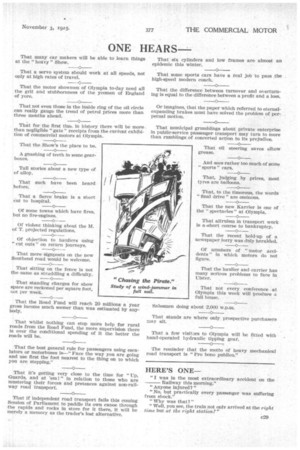ONE HEARS
Page 3

If you've noticed an error in this article please click here to report it so we can fix it.
That many car makers will be able to learn things at the "heavy "Show.
That a servo system should work at all speeds, not only at high rates of travel.
That the motor showmen of Olympia to-day need all the grit and stubbornness of the yeomen of England of yore.
That not even those in the inside ring of the oil circle can really gauge the trend of petrol prices more than three months ahead.
That for the first time. in history there will be more than negligible " gate " receipts from the current exhibition of commercial motors at Olympia.
That the Show's the place to be.
A gnashing of teeth in some gearboxes.
Tall stories about a new type of of alloy.
That such have been heard before.
That a fierce brake is a short cut to hospital.
Of some towns which baye fires, but no fire-engines.
Of violent thinking about the \'I. ofT. projected regulations.
Of objection to hauliers using "cut outs" on return journeys.
That more Signposts on the new Southend road would be welcome.
That sitting on the fence is not the -same as straddling a difficulty.
That standing charges for show space are reckoned per square foot, not per week.
That the Road Fund will reach 20 millions a year gross income much sooner than was estimated by anybody.
That whilst nothing can stop more help for rural roads from the Road Fund, the more supervision there is over the conditional spending of it the better the roads will be.
That the best general rule for passengers using escalators or motorbuses is—" Face the way you are going and use first the foot nearest to the thing on to which you are stepping."
That it's getting very close to the time for "Up, Guards, and at 'ern I" in relation to those who are mustering their forces and pretences against non-railway road transport.
That if independent road transport fails this coming Session of Parliament to paddle its own canoe through the rapids and rocks in store for it there, it will be merely a memory as the trader's lost alternative. That six cylinders and low frames are almost an epidemic this winter.
That some sports cars have a real job to pass the high-speed modern coach.
That the difference between turnover and overturning is equal to the difference between a profit and a loss.
Or imagines, that the paper which referred to eternalexpanding brakes must have solved the problem of perpetual motion.
That municipal grumblings about private enterprise in public-service passenger transport may turn to more than rumblings of concerted action to its prejudice.
That oil steering saves elbow grease.
And sees rather too much of some " sports " cars.
That, judging by prices, most tyres are balloons.
That, to the timorous, the Words "final drive" are ominous.
That the new Karrier is one of the " spectacles " at Olympia.
That altruism in transport work is a .short course to bankruptcy.
That the recent hold-up of a newspaper lorry was duly heralded.
Of numbers of "motor accidents" in which motors do not figure.
That the haulier and carrier has many serious problems to face in Ulster.
That not every conference at Olympia this week will produce a full house.
Salesmen doing about 2,000 w.p.m.
That stands are where only prospective purchasers may sit.
That a few visitors to Olympia will be fitted with hand-operated hydraulic tipping gear.
The reminder that the motto of heavy mechanical road transport is "Pro bono publico."
HERE'S ONE
"I was in the most extraordinary accident on the
Railway this morning."
"Anyone injured?"
"No, but practically every passenger was suffering from shock."
"Why was that?"
"Well, you see, the train not only arrived at the right time but at the right station! "
















































































